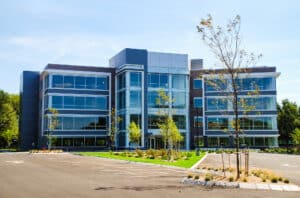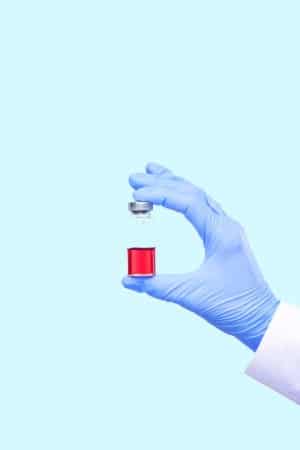It’s described as the “only game in town” and office landlords want a piece of the action.
As the office market in Greater Boston continues to suffer amidst the pandemic – with firms listing more than 2.7 million square feet of office sublease space in recent months – the region’s life-science sector remains red–hot, as biotech and pharmaceutical companies continue to sign major leases and relentlessly look to expand.
In fact, several commercial real estate brokers say zero life-science space has been listed for sublease in the area, a sign of just how comparatively strong demand remains for lab and R&D space, especially with dozens of local life-science companies directly or indirectly involved with COVID-19 vaccine research.
Some developers are cleaning up on recent new-construction projects as the result of the voracious demand, such as DivcoWest, which last month scored a major triumph when Bristol-Myers Squibb agreed to lease 360,000 square feet at a new building under construction at DivcoWest’s Cambridge Crossing.
But some office building owners, who are seeing their facilities slowly bleeding tenants as a result of the pandemic’s remote-working phenomenon, are now looking at how they can get a piece of the life-science action, described by one industry official as “the only game in town” when it comes to commercial real estate.
Among others, Rockpoint Group, owner of the 1.1 million–square-foot 100 Summer Street in Boston, is now offering some of its lower floors of traditional downtown office space for possible conversion, according to industry sources.
‘Right Bones’ Needed
Meanwhile, other office landlords are calling commercial real estate brokers to inquire about the feasibility of conversions.
“We’re definitely seeing landlords reconsidering their property assets and the possibility of converting some of them into life-science space,” said Mark Riley, an associate at Hunneman, a Boston commercial real estate firm. “Conversions have been a hot topic.”
John Osten, a managing director at JLL, agrees that conversions are on a lot of people’s minds lately. “We’ve studied a number of buildings for possible conversions. Not everyone can do it. But people are looking,” Osten said.
One major obstacle for office-to-lab conversions is they’re expensive – $125 to $150 per square foot minimum, not including special build-out requirements from tenants – due to the physical demands of life-science companies.
According to Riley and Osten, life science companies need facilities with high ceilings, strong load-bearing floors, robust electrical systems and excellent ventilation.
So not all buildings can be converted as a result.
“Conversions are only possible if a building has the right bones,” said Mark Winters, vice chairman at Newmark Knight Frank in Boston.
Industry Wants Flexible Lease Terms
Another challenge for building owners thinking of conversions is that life-science companies, many of them start-ups, are asking for shorter leases than normal, in the seven– to eight-year range. Winters said it also takes time to convert older buildings into life-science facilities – and many potential tenants need space as soon as possible.
Not that conversions are impossible. Conversions of older properties, particularly industrial buildings, have been going on for years now, especially in Cambridge’s booming Kendall Square area.

After failing to find a tenant for a speculative office building at 4 Burlington Woods, The Gutierrez Co. formed a joint venture partnership to convert the 109,500-square-foot building into lab-ready space. Photo courtesy of The Gutierrez Co.
“Conversions have been a trend for a while, but only recently has the talk really picked up,” Osten said.
Some of the recent conversion projects launched before the pandemic include “The Beat,” at the site of the old Boston Globe facility on Morrissey Boulevard in Boston, now being marketed by CBRE; and the Gutierrez Co.’s Burlington BioCenter, a vacant speculative office building.
According to Hunneman, there’s also Arsenal on the Charles, recently purchased by Alexandria Real Estate with plans of converting the 700,000 square-foot office facility into labs; three tenants have already been secured for the site.
In addition, Hunneman notes that 705 Mount Auburn St. in Watertown, the former 497,000 square-foot headquarters of Tufts Health Plan, will be converted into labs by Spear Street Capital of California.
And the list goes on.
The Davis Cos. and Marcus Partners earlier this month sold off Reservoir Woods, a 1 million square-foot office and R&D facility in Waltham, to Alexandria Real Estate Equities, a major life-science developer that’s been expanding its reach from Cambridge into the suburbs of late. Alexandria is reportedly looking at converting some of Reservoir Woods into lab-ready facilities, though a spokesman for Alexandra declined comment for this story.
Careful Evaluation Necessary
Michael Cantalupa, chief development officer at The Davis Cos., noted that his company has completed its own conversions in recent years, such as the industrial-to-labs conversion of 36,000-square-foot 75 Moulton St. in Cambridge. Davis Cos. also converted 10 Wilson Road in Cambridge’s Alewife area into labs.
“We will continue to look for buildings that can be converted into [lab-ready space],” Cantalupa said.
But he stressed that Davis Cos. and all other life science developers must crunch the numbers carefully – and make doubly sure buildings are the right type and fit – before proceeding with conversion deals.
“You don’t put such large sums of money into [conversion projects] and not have robust lab space in the end,” said Cantalupa. “It has to be quality work.”
To date, no new conversion project has been announced and proceeded substantially forward since the pandemic started in March, industry executives noted. Not enough time has passed for a company to review, negotiate and sign complex deals, let alone get necessary permits and start drawing up preliminary construction plans.
But that hasn’t stopped office owners, and developers, from exploring and talking about future conversions or new ground-up developments.
“If a developer is pursuing anything these days, it’s lab activity,” said Cantalupa.




 |
| 


